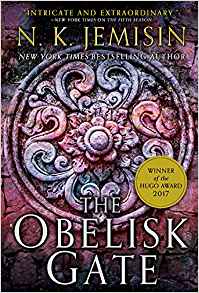I put down The Obelisk Gate for about three and a half months when I was four-fifths of the way through. One of the main characters, a girl not yet in her teens, did something horrible, and I just couldn’t anymore. I haven’t had that strong a reaction since Elric killed Moonglum near the end of Stormbringer (spoilers, sorry), and I vividly remember teen me throwing that book clear across the room. And I hadn’t planned to pick up The Obelisk Gate again. I figured I would start writing about it by saying that it was ok not to finish difficult books, that it was ok not to read all the way to the end of a book that is good, that is strong, but puts a reader out of it for one reason or another.
The action that the younger character takes isn’t even that awful in the context of Jemisin’s Broken Earth trilogy. The first book starts with a powerful magician tearing a hole in the world’s crust, an action that will kill many thousands nearly instantly, and a significant share of the world’s population as the after-effects spread. I wrote that The Fifth Season is a bleak book, and The Obelisk Gate continues in a similar fashion, though of course neither book is unremittingly bleak. I wanted to believe that Nassun, the daughter of Essun, who is one of the main viewpoints introduced in The Fifth Season, was not as damaged as the other people around her, that the apparent sanctuary she had found was a place that might be hard but was not as corrupt as the others shown on the Broken Earth. I had not fully faced that she brought corruption with her in a relationship that a friend described as being set up like Luke and Yoda, except it turns out that Yoda is Palpatine.
And yet I was never able to set The Obelisk Gate fully aside, to put it physically with the books that I have finished and don’t expect to come back to for quite a while. I wondered where the story would go, what the characters would do. I wanted to know.
The end of The Fifth Season resolved why the first book was told from three points of view. The Obelisk Gate begins to resolve why parts of both books are told in the second person. It hints, but does not completely reveal, who is doing the telling. One of the two principal storylines follows Essun, who has fled her community in search of both her daughter Nassun and refuge from the effects of the Season that follows the cataclysm that opened The Fifth Season. She eventually finds a place in a hidden, underground community that appears to offer an alliance between orogenes and humans without their powers. That community faces external and internal threats, and coming to terms with them forces Essun to reach for abilities and connections she had not known she could make, while also causing her to question her assumptions about the earth-shaping powers that have defined her life. The other follows Nassun who flees far to the south with her father, eventually coming under the tutelage of a Guardian, one of the people who kept orogenes on a leash before civilization collapsed (again).
The world is immersive, and both storylines urgent. The world is bleak, but people in it wish to hell it didn’t have to be. They’re doing the best they know how, most of them anyway, in times that will force harsh choices from even the gentlest of natures.
There’s also a political context for anyone who cares to look.
“Crazy” is also what roggas who obey choose to call roggas that don’t. You obeyed, once, because you thought it would make you safe. [Alabaster, the rogga who broke the world] showed you — again and again, unrelentingly, he would not let you pretend otherwise — that if obedience did not make one safe from the Guardians or the nodes or the lynchings or the breeding or the disrespect, then what was the point? The game was too rigged to bother playing. (p. 159)
You know you’re right. The belief that orogenes will never be anything but the world’s meat dances amid the cells of you, like magic. It isn’t fair. You just want your life to matter. (p. 296)
It’s an intricate book, full of rounded characters. It’s engaging, readable, difficult to put down. It’s also difficult to keep going.
The Obelisk Gate was the fourteenth bit of Hugo reading that I completed this year, and the tenth I have written about. It won this year’s award for best novel.


2 comments
2 pings
Did you come to terms with what Nassun did or continue on in spite of it?
Author
In spite of.
[…] other voters. I would have given the award to N.K. Jemisin for her short story, rather than for The Obelisk Gate. The novella I liked best placed fifth in voting, while the novelette I liked best was the one that […]
[…] a child in supposed service to a greater cause then I would go back and read The Fifth Season and its sequels, but I don’t. I had given Black Sun a pass — well, not a pass, something more of […]